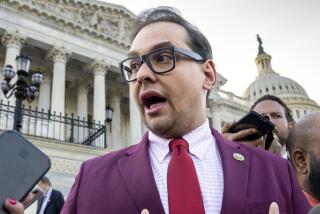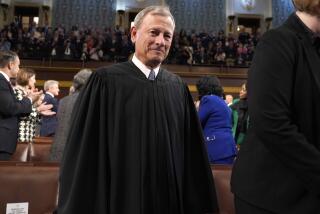Cranston’s S&L; Defense Weakened : Congress: Senate ethics panel investigators have apparently rejected a key argument in his case. The judgment could affect the rest of the Keating Five.
- Share via
WASHINGTON — In a major setback for Sen. Alan Cranston (D-Calif.), Senate Ethics Committee investigators apparently have rejected one of his key arguments for defending himself against charges that he intervened improperly with federal regulators on behalf of Lincoln Savings & Loan, The Times has learned.
According to one source, who was questioned at length by the committee, Senate investigators do not accept Cranston’s contention that there is no evidence of wrongdoing in the so-called Keating Five case because two top federal regulators have said that they took no action in response to inquiries from the five senators involved in the controversy.
That argument has been a central part of Cranston’s defense in the Senate Ethics Committee investigation into charges that he and the four others--Sens. Donald W. Riegle Jr. (D-Mich.), Dennis DeConcini (D-Ariz.), John Glenn (D-Ohio) and John McCain (R-Ariz.)--intervened on Lincoln’s behalf while receiving large campaign donations from Charles H. Keating Jr., owner of the Irvine-based thrift.
The other senators have relied upon that argument to a much lesser extent than Cranston, but their cases also could be affected by the committee’s judgment of whether the senators’ lobbying had a impact on the decision-making of the federal regulators.
Cranston and the four other senators have been accused of bringing so much political pressure to bear on the Federal Home Loan Bank Board that it caused a two-year delay in the federal government’s decision to seize the ailing S&L.; By the time Lincoln was seized in April, 1989, its losses had mounted to more than $2 billion.
In addition to arguing that the regulators were not influenced by his inquiries, Cranston’s defense also relies heavily on his contention that there is no precedent in law prohibiting members of Congress from contacting government agencies on behalf of individual citizens, even those who are campaign contributors. There is no indication how the committee has interpreted that issue.
The Senate Ethics Committee, which has been investigating the charges against the five senators since last November, currently is interviewing a wide range of witnesses. But neither the committee members nor Robert Bennett, the special counsel hired by the panel to investigate the case, have been willing to discuss any aspect of the probe.
Sen. Howell Heflin (D-Ala.), chairman of the ethics panel, has privately told some of his colleagues that he does not expect any judgment to be rendered on the Keating Five before the election in November, sources said.
The political futures of all five senators may hinge on the results of the committee probe. Cranston’s popularity in California has slumped since the probe began, even though he has defended himself vigorously to the committee as well as to his constituents.
In a letter to the Senate Ethics Committee last Nov. 16, shortly after the panel opened its probe, Cranston emphasized that two former chairmen of the Federal Home Loan Bank Board, Edwin J. Gray and M. Danny Wall, have said that their decision-making was unaffected by any of the pleas that the five senators made on behalf of Lincoln. He has since reiterated that point many times in speeches and press conferences, both in Washington and California.
In a Feb. 16 speech to the California Newspaper Publishers Assn., for example, Cranston emphasized that Gray--whom he described as “my chief accuser”--had testified under oath “that he did not take any action, refrain from any action or delay any action because of anything I or the other senators said or did.” He noted that Wall had made a similar statement under oath.
But a committee witness, who declined to be identified, said the questions posed by the investigators clearly indicated that they do not accept Cranston’s view that no action was taken as a result of intervention by the Keating Five. Moreover, the source said, investigators do not appear to agree that there is no case to be made against the senators if in fact Gray and Wall declined to act on their requests.
The witness’ observations were corroborated by others familiar with the case.
In addition, according to the source, the committee’s investigation is a wide-ranging one that does not focus solely on the meetings that the senators had with Gray on April 2, 1987, or the follow-up session with bank board employees two days later. These two sessions, in which the senators allegedly sought the withdrawal of a bank board regulation opposed by Keating, were the primary focus of House hearings into the Keating affair late last year.
Cranston has strongly denied that he put pressure on Gray or the bank board during those meetings in April, 1987. In the first meeting, he said, the only thing he wanted to know was how soon the board’s investigation of Lincoln would be concluded. And Cranston has frequently noted that he attended the second meeting only briefly.
Nevertheless, Cranston’s efforts on behalf of Keating were by no means confined to those two meetings. Thus a wide-ranging probe by Senate investigators will almost certainly focus on Cranston’s other contacts with federal and state regulators.
Both Cranston and DeConcini telephoned Wall in January, 1989, urging the board to permit Keating to sell Lincoln to a buyer that had been chosen by the savings and loan owner, according to Wall. In addition, Wall has said that after Lincoln was seized on April 14, 1989, Cranston told him that the government was making “a mistake.”
Additionally, Cranston’s top aide on the Senate Banking Committee, Carolyn Jordan, also made at least two telephone calls on Keating’s behalf. A key bank board official and a top state S&L; regulator in California both have said that they were contacted on Keating’s behalf by Jordan.
Although most members of the ethics committee have been silent about the Keating Five case thus far, one panel member, Sen. Terry Sanford (D-N.C.), offered encouragement to the senators under investigation recently when he told a town meeting in Statesville, N.C., that the Keating Five “did exactly what every senator is called on to do every day.”
While Sanford is a relative newcomer to the ethics committee whose opinion is not likely to carry as much weight as that of Heflin or Sen. Warren B. Rudman (R-N.H.), the ranking Republican, the North Carolina senator’s sentiments are identical to those expressed by Cranston.
In his Nov. 16 letter to the committee, Cranston said he was concerned about the future of Lincoln primarily because it had 740 employees and 140,000 depositors in the state of California. He said that the message he conveyed to Gray--that the bank board should act “promptly and responsibly” in the Lincoln case--was the same message he gives to other government officials whose actions affect California.
In a legal brief accompanying his letter, Cranston’s lawyer, William W. Taylor, noted that in a 1972 decision involving the case of former Sen. Daniel B. Brewster of Maryland, the Supreme Court acknowledged that senators “are constantly in touch with the executive branch of the government and with administrative agencies--they may cajole and exhort with respect to the administration of federal statutes.”
He also cited Justice Byron R. White’s dissenting opinion in the Brewster case, which warned prosecutors not to mistakenly confuse campaign contributions with illegal bribes that a member of Congress might receive for his personal use.
More to Read
Get the L.A. Times Politics newsletter
Deeply reported insights into legislation, politics and policy from Sacramento, Washington and beyond. In your inbox twice per week.
You may occasionally receive promotional content from the Los Angeles Times.









